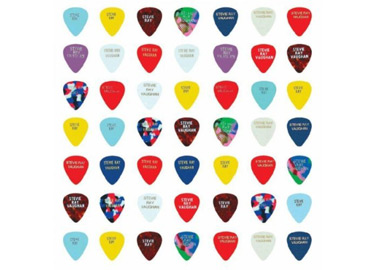Bill Orcutt
How the Thing Sings
(Editions Mego)
Bill Orcutt is best known for his work with the assaultive noise trio Harry Pussy, but his second solo acoustic guitar album may change that. The seven pieces on How the Thing Sings embrace primal Delta blues, the abstract improv of Derek Bailey, and the pioneer of this brand of instrumental guitar music, John Fahey. Orcutt filters these influences through his own sensibility, creating stutteringly fractured music that’s sandpaper abrasive and plaintively beautiful. The opening salvo “No True Vine” is a manic scribble of notes that arrests through sheer velocity. “The Visible Bosom” offers tangles of riffs that clench and release, lurching between delicate strums and machine-gun bursts. “A Line from Ol’ Man River” teases out the standard’s melody, making it freshly vital and mutantly strange. Throughout, Orcutt softly moans as he accompanies himself, adding another voice to the total song. —Jeff Jackson
*
Bowerbirds
The Clearing
(Dead Oceans)
Does misery always trump contentment in the creation of art? This is the existential question that most insistently comes to mind when listening to The Clearing. You can hear that the Bowerbirds are grasping for something, both melodically and lyrically, like the sound of Elliot Smith, but they ultimately lack the pure, naked emotion that seems to have tortured that artist’s every waking minute. The new songs’ production and arrangements only enhance the comparison, utilizing cello pads, rolling arpeggios on an old, slightly out-of-tune piano and those trademark double-tracked vocals that made Smith’s sound so distinct in its time. They’re all skillfully constructed and inspired in their own ways, and are surely intimate insights into a couple’s relationship; but if this couple has felt pain, it did not cut them to the bone, and they did not bleed for long. —Tom Sturm
*
The Big Pink
Future This
(4AD)
They took their name from the former home of iconic roots rockers the Band. Still, the output of English electro-rock duo Robbie Furze and Milo Cordell couldn’t be farther from the sounds of the ’60s. On their new release, the two attempt to pick up where their 2009 debut A Brief History of Love left off and create post-punk pop with huge choruses that wouldn’t be out of place on an indie dance floor of the Cure’s heyday. Album opener and first single “Stay Gold” sets the formula. Heavily processed synth sounds cascade over a mid-tempo drum machine beat while the optimistic vocals trumpet “shining a light.” Unfortunately, subsequent tracks feature little variation and fail to distinguish themselves from each other over 40-plus minutes. The one exception is closing number “77,” a surprisingly tender ballad. —Michael Cimaomo



